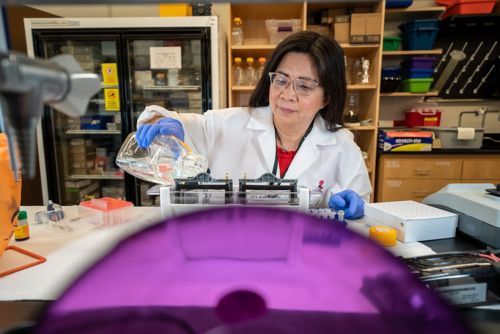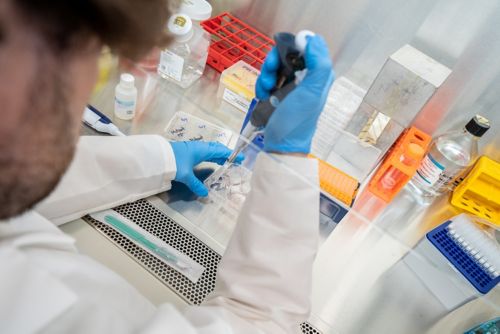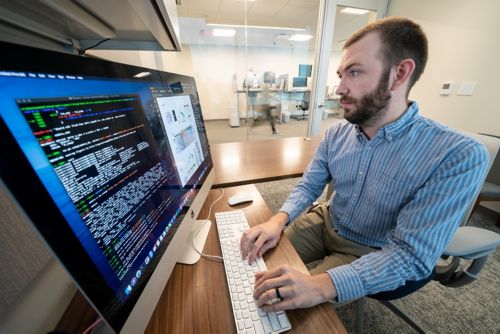Paul Northcott Lab
Leveraging multi-omic bulk and single-cell approaches to decipher molecular landscapes and developmental origins of medulloblastoma
About the Northcott Lab
Medulloblastoma is one of the most common and lethal childhood brain tumors. Current therapeutic approaches are successful in only a portion of cases, and survivors often face severe long term side effects. To improve the effectiveness and safety of clinical intervention, a deeper understanding of the biological and clinical heterogeneity of medulloblastoma is required. Our laboratory leverages expertise in genomic technologies and bioinformatics to decipher the developmental, cellular, and mechanistic basis of this catastrophic pediatric cancer.

In the News
Cancer is not a monolith but a landscape of diseases with different drivers. Scientists at St. Jude are leading studies on how understanding molecular groups can advance cancer care. Read about it. #StJudeOn
Northcott Lab research summary
To explore the heterogeneity, lineage-specific origins, and potential vulnerabilities of medulloblastoma, our lab uses a multi-faceted approach that includes translational genomics, discovery-driven bioinformatics, functional validation, and fundamental neurodevelopmental studies. Our current focus is to dissect molecular landscapes in the context of tumor subgroups and functionally validate candidate driver genes and potential dependencies using innovative modalities and preclinical models. Ultimately, we aim to translate our discoveries to improved diagnosis, stratification, and treatment options for patients and families.
Deciphering disease heterogeneity and mapping the landscape of gene regulation
Intertumoral heterogeneity has been substantiated in MB through a range of genetic, genomic, transcriptomic, epigenomic, and proteomic studies. However, it has been long suspected that extensive intratumoral heterogeneity also exists in MB, supported by subclonal genetic events observed in the analysis of bulk tumors. Single-cell sequencing overcomes limitations imposed by bulk genome sequencing approaches and enables molecular summarization of 100s to 1000s of individual cells from a particular tumor sample. We have generated single-cell transcriptomic datasets on a series of freshly resected MBs and patient-derived xenografts. Analyzing this dataset, alongside a single-cell transcriptional atlas of murine cerebellar development, we uncovered novel subgroup-specific heterogeneity and cellular hierarchies. We continue to expand our investigations into intratumoral heterogeneity through application of cutting-edge multi-omic single-cell approaches on large cohorts of fresh and frozen tumors.

Irrespective of molecular subgroup, up to half of all MBs exhibit a clear somatic alteration targeting chromatin modulators or transcription factors. This suggests that interference with normal physiologic gene regulation is a fundamental feature of medulloblastoma pathogenesis. Despite the prevalence of these alterations, how deregulation of chromatin/transcriptional machinery contributes to MB remains poorly defined. Our lab is studying the molecular and phenotypic consequences of MB-associated chromatin modifier mutations in relevant developmental contexts. Using CRISPR-mediated genetic perturbation, targeted protein degradation, genetically engineered mouse models and integrative chromatin state profiling, we interrogate high priority candidates to reveal prominent themes in chromatin deregulation. Of particular interest is the oncogenic mechanism of enhancer hijacking. We are working to decipher how the local 3D genome is altered through structural variation to allow for this phenomenon.
Using translational genomics to improve clinical practice
A profound predictor of mortality in children affected by MB is disease relapse. Patient subgroup remains stable at recurrence, but the degree to which somatic driver events are conserved or divergent at relapse remains poorly described. Most clinical trials for MB evaluate targeted therapies in patients with recurrent disease, so understanding how relapse relates to primary malignancy will be transformative. We are evaluating the molecular landscapes of matched patient samples from St. Jude and collaborating sites. In parallel, we’re conducting functional studies in preclinical models to identify mechanisms of evolution in MB following treatment.

Efforts to improve outcomes in children diagnosed with MB have been hampered by the lack of sensitive biomarkers to stratify treatment response and predict relapse. Potential tumor evolution with treatment implies that capturing genomic profiles at recurrence is essential for identifying actionable therapeutic vulnerabilities. Liquid biopsies have recently shown promise for detecting and tracking tumor-specific genomic alterations, including targeted sequencing of tumor-derived cell-free DNA collected from cerebrospinal fluid (CSF) of patients. Our lab has developed an experimental pipeline for tracking disease status in CSF-derived cfDNA collected from patients enrolled on recent and ongoing St. Jude clinical trials.
In collaboration with clinicians and scientists within the Neurobiology and Brain Tumor Program of the St. Jude Comprehensive Cancer Center, we are summarizing detailed molecular profiles (i.e. DNA methylation, whole-genome sequencing, whole-exome sequencing, RNA-seq, quantitative proteomics, etc.) for patients enrolled on recent and current MB trials run through St. Jude and Children’s Oncology Group (COG). By interpreting gene mutations, structural variants, copy-number alterations, transcriptomes, proteomes, and molecular subgroup/subtype status in the context of meticulously annotated clinical trial series, we aim to identify discrete patient risk groups, including those likely to benefit from reduced or more intensive therapy, as well as patients representing rational candidates for molecularly targeted therapies.
Northcott Lab selected publications
Contact the Northcott Lab
Paul A. Northcott, PhD
Member, St. Jude Faculty
Department of Developmental Neurobiology
MS 325
St. Jude Children's Research Hospital
Follow Us

Memphis, TN, 38105-3678 USA GET DIRECTIONS